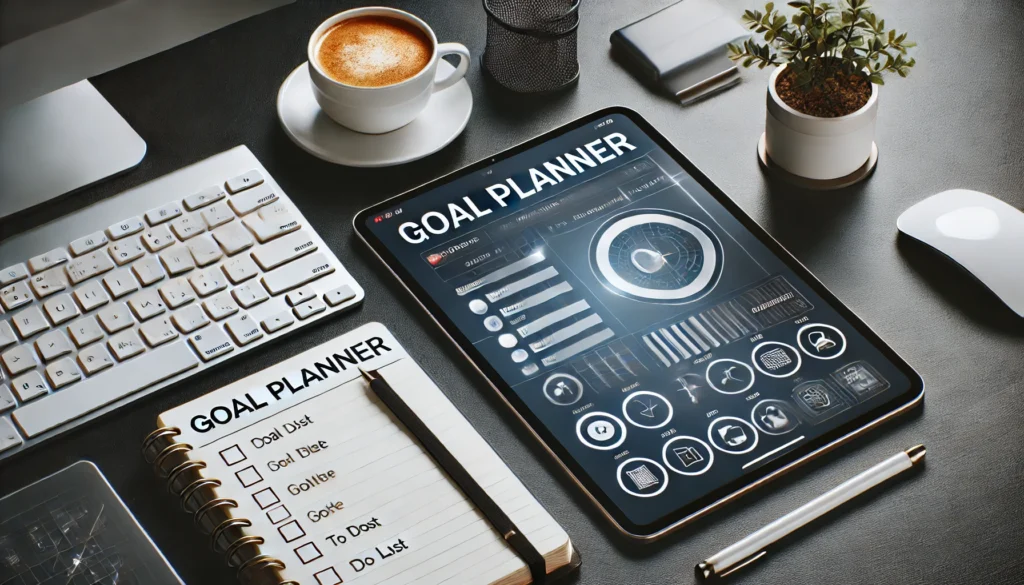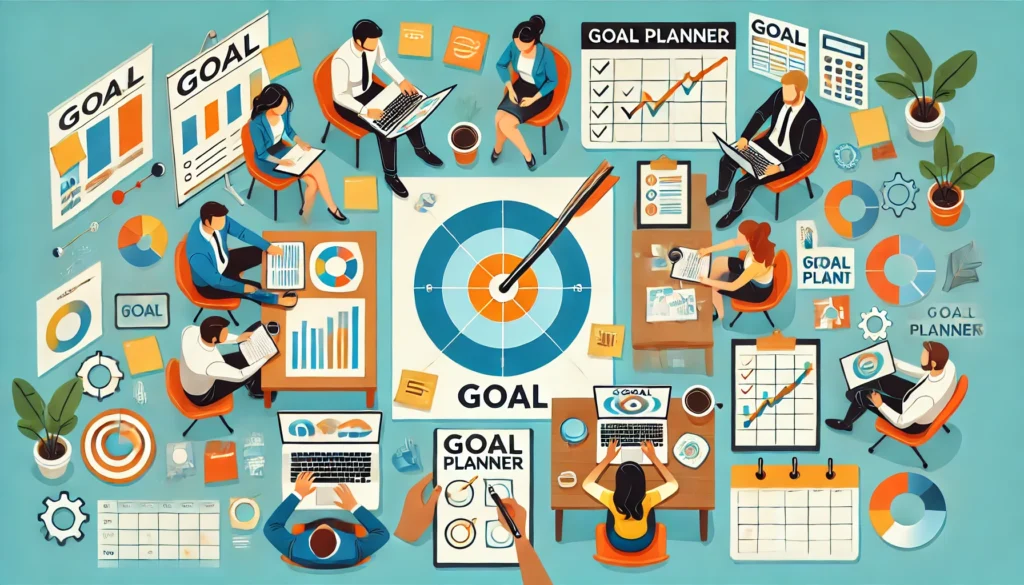Goal planners extend beyond a mere modern trend; they are a fusion of historical practices and modern insights into human psychology and productivity. At their heart, goal planners assist in setting, tracking, and achieving both short-term and long-term goals. By infusing structure, clarity, and motivation into our lives, these planners can revolutionize daily routines and maximize productivity.
You may also like: How to Set and Reach Your Goals
The Historical Context of Goal Setting
The practice of goal setting is deeply rooted in history. Ancient civilizations, such as the Greeks and the Chinese, understood the importance of setting clear objectives. Philosophers like Aristotle discussed the value of deliberate planning and action in attaining personal satisfaction and contributing to society.
In the industrial revolution era, the emergence of corporate culture brought a more structured approach to goal setting. This period saw the development of various organizational and personal productivity tools aimed at enhancing efficiency and goal achievement.
As we progressed into the 20th century, goal setting gained prominence in self-help literature and psychological studies, further cementing its role in personal and professional success.
Current Trends in Goal Planning
Today’s technological advancements have revolutionized goal setting. Digital planners and apps now sync seamlessly with our devices, offering a plethora of options. Despite this digital shift, traditional pen-and-paper planners retain their charm, providing a tactile experience that digital screens cannot replicate.
The market is flooded with various planners, from those focusing on yearly goals to daily planners for specific demographics, like men or entrepreneurs. The key is selecting a tool that resonates with your lifestyle and preferences.
Moreover, the rise of specialized goal-setting planners, which cater to specific needs such as wellness or career growth, reflects the growing demand for personalized planning solutions.
Psychological Insights into Goal Planning
Goal planners leverage psychological principles to enhance productivity. Studies show that writing down goals increases the likelihood of achieving them, a concept known as the “generation effect.” This act of creating and organizing information bolsters memory and retention.
Planners also facilitate self-regulation, a cognitive process involving setting standards, monitoring progress, and adjusting behaviors to achieve desired outcomes. By utilizing a planner, individuals engage in self-regulation, a crucial aspect of successful goal achievement.
Choosing the Right Goal Planner
Selecting the right planner is pivotal for maximizing its effectiveness. Here are some key aspects to consider:
Personalization
A planner that offers personalization options significantly boosts your engagement with it. Look for planners that allow customization, including sections for notes, reflections, or mood trackers, catering to your unique preferences.
Personalized planners can adapt to changing goals and lifestyles, ensuring they remain relevant and useful over time. They also enhance motivation, as a tailored planner feels more like a personal partner in your productivity journey.
Moreover, personalization extends to aesthetics—choose colors and designs that resonate with you, making the planner a visually appealing tool you enjoy using daily.
Layout and Design
The layout of a planner greatly influences its usability. Some individuals prefer daily planners that break tasks into hour-by-hour slots, while others may opt for a weekly or monthly overview.
Consider whether you thrive on detailed, granular planning or if a broader overview better suits your needs. The design should complement your natural workflow, making planning intuitive and efficient.
Additionally, explore planners with integrated features like habit trackers or gratitude journals, which can enhance your planning process and overall well-being.

Goal-Setting Framework
The goal-setting framework offered by a planner is crucial. Popular frameworks include SMART (Specific, Measurable, Achievable, Relevant, Time-bound) goals and OKRs (Objectives and Key Results).
These frameworks provide structured methodologies to help define and track objectives. Evaluate different frameworks to determine which aligns best with your goal-setting style and needs.
Furthermore, some planners incorporate innovative frameworks that blend traditional methods with modern insights, offering unique approaches to achieving goals.
Implementing Goal Planners into Your Routine
Incorporating a goal planner into your routine demands discipline and consistency. Here are some strategies to seamlessly integrate it into your daily life:
Start with Clear Objectives
Initiate your planning process by setting clear, concise goals. Whether aiming for personal growth, career advancement, or wellness targets, define what success looks like for each objective.
Clear objectives provide direction and purpose, making the planning process more focused and meaningful. They also serve as a benchmark against which you can measure progress.
Additionally, consider categorizing goals into different areas of your life, such as health, relationships, and career, to ensure a balanced approach to goal setting.
Break Down Goals into Actionable Steps
Once goals are established, break them down into smaller, actionable tasks. This approach not only makes goals more manageable but also provides a sense of accomplishment as you tick off each step.
Actionable steps create a clear roadmap to achieving larger goals, reducing overwhelm and increasing motivation. They also allow for flexibility, as you can adjust tasks as needed to adapt to changing circumstances.
Furthermore, consider setting deadlines for each task to maintain momentum and ensure steady progress toward your objectives.
Regular Review and Adjustments
Schedule regular reviews of your goals and progress. This practice ensures alignment with your objectives and allows for necessary adjustments.
Regular reviews provide an opportunity to celebrate achievements and identify areas for improvement. They also help maintain motivation and focus by reinforcing the importance of your goals.
Moreover, use reviews as a chance to reflect on what strategies are working and what changes might be needed to overcome obstacles or enhance productivity.
The Science Behind Goal Planning
The effectiveness of goal planners is deeply rooted in psychological principles. Research demonstrates that writing down goals increases the likelihood of achieving them, a phenomenon often referred to as the “generation effect.”
This effect suggests that creating and organizing information enhances memory and retention, making goals more tangible and achievable.
Self-Regulation and Goal Achievement
Goal planners facilitate a cognitive process known as “self-regulation.” This process involves setting standards, monitoring progress, and adjusting behaviors to achieve desired outcomes.
By using a planner, individuals engage in self-regulation, which is a critical component of successful goal achievement. It fosters accountability, as individuals can track their progress and make informed adjustments.
Self-regulation also encourages proactive behavior, empowering individuals to take charge of their productivity and make intentional choices aligned with their goals.
Motivation and Accountability
Goal planners enhance motivation by providing a clear visual representation of goals and progress. Seeing goals written down and tracking achievements can boost motivation and reinforce commitment.
Accountability is another key benefit of using a planner. By regularly reviewing and updating goals, individuals hold themselves accountable for their progress, increasing the likelihood of success.
Moreover, planners can serve as a motivational tool, offering inspirational quotes or prompts that encourage reflection and positive thinking.
Enhancing Focus and Reducing Overwhelm
Planners help enhance focus by organizing tasks and priorities, reducing mental clutter and overwhelm. By clearly outlining what needs to be done, planners enable individuals to concentrate on one task at a time.
This focus reduces stress and increases efficiency, as individuals can channel their energy into completing tasks rather than worrying about what comes next.
Additionally, planners can provide a sense of control, empowering individuals to manage their time and tasks effectively and confidently.
Future Implications of Goal Planners
As technology continues to evolve, so too will the capabilities of goal planners. We can anticipate more advanced features, such as AI-driven recommendations, personalized insights, and integration with wearable technology to track health and wellness goals.
AI and Personalized Insights
AI-driven planners could offer personalized insights and recommendations based on user behavior and preferences. These planners may analyze patterns and suggest optimal strategies for achieving goals.
Personalized insights could also include reminders or alerts to stay on track, as well as suggestions for overcoming obstacles or enhancing productivity.
Furthermore, AI integration could enable planners to adapt to changing circumstances, providing dynamic and responsive support for goal achievement.

Integration with Wearable Technology
The integration of planners with wearable technology could revolutionize goal tracking, particularly in areas like health and wellness. Planners could sync with devices to monitor physical activity, sleep patterns, and stress levels.
This integration would allow for a holistic approach to goal setting, combining data from various sources to provide comprehensive insights into progress and well-being.
Moreover, wearable technology could facilitate real-time tracking and feedback, enhancing motivation and accountability.
Focus on Mental Health and Work-Life Balance
The increasing emphasis on mental health and work-life balance will likely influence the design and functionality of future planners. As individuals seek holistic approaches to productivity, planners that incorporate elements of mindfulness, stress management, and self-care will become increasingly popular.
Future planners may offer features like guided meditations, stress-relief exercises, or prompts for self-reflection, supporting mental health and well-being.
Additionally, planners that promote work-life balance by encouraging regular breaks or setting boundaries between work and personal time could become essential tools for modern productivity.
Practical Advice for Maximizing Productivity with Goal Planners
For those looking to optimize productivity using goal planners, here are some practical tips:
Consistency is Key
Make it a habit to use your planner daily. Consistency builds momentum and reinforces your commitment to your goals.
Daily use helps establish a routine, making goal planning a natural and integral part of your day. It also ensures that you remain focused and aligned with your objectives.
Moreover, consistent use allows you to track progress effectively, making it easier to identify patterns and make informed adjustments.
Stay Flexible
Life is unpredictable, and plans may need to change. Be open to adapting your goals and strategies as circumstances evolve.
Flexibility is crucial for maintaining motivation and avoiding frustration. By remaining adaptable, you can adjust your approach to overcome challenges and seize new opportunities.
Additionally, staying flexible allows you to incorporate new insights or priorities into your planning process, ensuring that your goals remain relevant and achievable.
Celebrate Milestones
Recognize and celebrate your achievements, no matter how small. This positive reinforcement boosts motivation and encourages continued progress.
Celebrating milestones provides a sense of accomplishment and reinforces the value of your efforts. It also helps maintain enthusiasm and commitment to your goals.
Furthermore, taking time to acknowledge successes fosters a positive mindset, enhancing overall well-being and productivity.
Incorporate Reflection
Set aside time for reflection. Assess what worked, what didn’t, and how you can improve your approach moving forward.
Reflection provides valuable insights into your progress and challenges, enabling you to make informed decisions about your goals and strategies.
By regularly reflecting on your experiences, you can identify patterns, celebrate achievements, and pinpoint areas for improvement, enhancing your overall productivity and goal achievement.

Conclusion
Goal planners are powerful tools that, when used effectively, can significantly boost productivity and help you achieve your aspirations. By understanding the science behind goal setting, choosing the right planner, and integrating it into your routine, you can unlock your full potential and navigate the complexities of modern life with confidence.
With the right mindset and tools at your disposal, you’re well on your way to becoming a master of productivity. Embrace the journey and watch as your goals transform from dreams into reality, empowering you to lead a fulfilling and successful life.
Further Reading:
Boost Productivity with a Goal Planner: Achieve More and Succeed!
How planner can increase your productivity
WHY A DAILY PLANNER IS THE ULTIMATE PRODUCTIVITY TOOL
Important Note: The information contained in this article is for general informational purposes only, and should not be construed as health or medical advice, nor is it intended to diagnose, prevent, treat, or cure any disease or health condition. Before embarking on any diet, fitness regimen, or program of nutritional supplementation, it is advisable to consult your healthcare professional in order to determine its safety and probable efficacy in terms of your individual state of health.
Regarding Nutritional Supplements Or Other Non-Prescription Health Products: If any nutritional supplements or other non-prescription health products are mentioned in the foregoing article, any claims or statements made about them have not been evaluated by the U.S. Food and Drug Administration, and such nutritional supplements or other health products are not intended to diagnose, treat, cure, or prevent any disease.


